News and Past Events
FSE Postdoc Holiday party - 9 December 2024
The traditional FSE postdoc holiday party was a success once again! Held on December 9th, 2024, at the Brouwerij Martinus, this festive gathering brought together the FSE postdocs for an evening of engaging conversations, laughter, and holiday cheer - all enjoyed over delicious snacks and drinks. The party also included a fun-filled gift exchange that featured playful "present-stealing" and even some negotiations.
Thank you to everyone who joined us! These gatherings offer a wonderful opportunity to connect with fellow postdocs, share experiences, and kick-off the celebrations of the holidays season. We look forward to seeing you at future events!
Happy Holidays everyone!
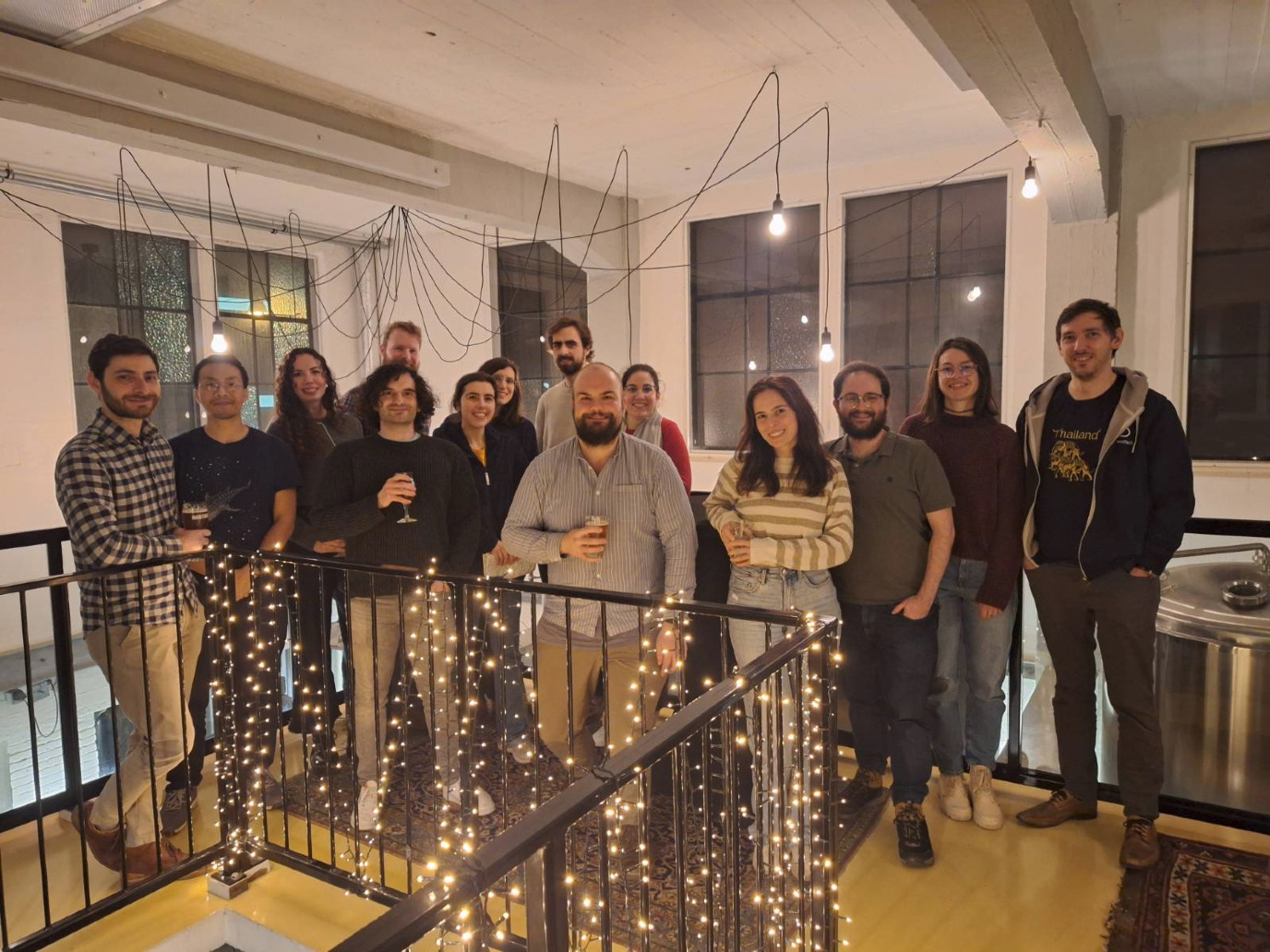
FSE Postdoc Prize 2024: four final competitors
This month, the yearly FSE postdoc prize will be awarded for the sixth time. The prize is an incentive, which is awarded to a successful postdoctoral researcher of the Faculty of Science and Engineering. It recognizes outstanding postdocs, who have demonstrated excellence in their research and who are showing the potential of becoming a scientific leader. The prize is awarded yearly and includes EUR 2,500 for an international scientific visit.
The winner will be revealed during the New Year’s Reception on January 6th. This year, seven postdocs were nominated by their institutes. After careful consideration, the four final competitors are (in alphabetical order):

Laura Heinen, Groningen Biomolecular Sciences and Biotechnology Institute (GBB)
My research is devoted to synthetic molecular out-of-equilibrium systems that mimic the properties and functions of living systems. For this reason, I joined the Poolman lab (GBB) as an oLife fellow (H2020-MSCA-COFUND 847675) to engineer minimal metabolic pathways for synthetic cells. My work focused on the feeding and recycling of adenosine triphosphate (ATP) inside small lipid vesicles. These vesicles mimic the mitochondria in eukaryotic cells. Using a simplified pathway, the organelle-like structures can regenerate and excrete ATP to fuel other synthetic cells. In my synthetic system, intervesicular adenine nucleotide cross-feeding is observed for hours to days, which is constantly adapting to the rates of ATP consumption (Nat. Nanotechnol., 2024). Since August 2023 I am an independent research group leader at DWI – Leibniz-Institute for Interactive Materials in Aachen (D) establishing my own group “Systems Materials”.
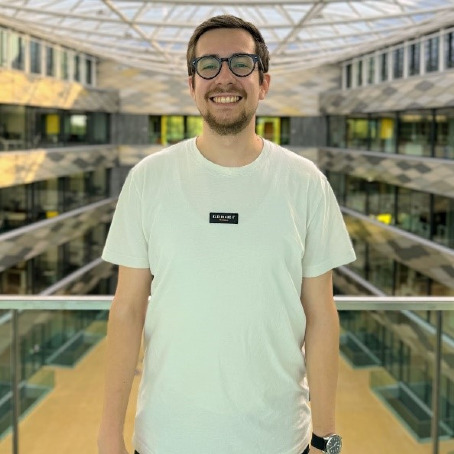
Lars Longwitz, Stratingh Institute for Chemistry
Enzymes display outstanding reactivities and selectivities in many different biological processes and chemical reactions. However, compared to chemical catalysts, they are limited by the functional groups present in the 20 natural amino acids. The idea of my research in Groningen is to expand the genetic code from the 20 natural amino acids and generate so-called designer enzymes and I wanted to include boron in an enzyme. In nature, the element number 5 boron does not play any significant part in biological systems. In contrast, boron compounds are used a lot in organic chemistry. During my postdoc work, I could show that a new-to-nature reaction was catalyzed by my boron enzyme to produce chiral compounds. The mechanism of the reaction is only achievable with boron catalysis, and no natural enzyme could perform such a reaction. Currently, I am working on extending the catalytic scope of boron enzymes.

Martin Lüdtke, Bernoulli Institute
My work is concerned with one of the oldest unsolved problems in number theory, going back to ancient Greece and even the Babylonians: determining the rational points on curves, in other words, solving equations in two variables using only fractions of whole numbers. A famous example is the equation xn + yn = 1 (where n > 2) which could only be solved in 1995, more than 350 years after Pierre de Fermat raised this question in the margin of a notebook in 1637. To this day there is no known algorithm to determine the rational points on an arbitrary curve. Twenty years ago, a novel framework was proposed to tackle this question, combining ideas from physics with modern techniques in number theory and geometry. This “non-abelian Chabauty method” has seen some spectacular successes in recent years; nevertheless, it is still far from being fully developed. In my research I strive to both improve our understanding of the theoretical foundations as well as make the method explicit and practical so as to come a bit closer to answering some long-standing open questions in mathematics.

Lara Vicino, Bernoulli Institute
Whenever digital information is stored on a server or sent across a communication channel, errors are the rule rather than the exception. What if every text you sent arrived with scrambled words? Or if your photos vanished in transmission? Fortunately, mathematics provides us with error-correcting codes, which are powerful tools keeping our communications clear and our data safely stored. Whether texting or scrolling through Instagram, we rely on error-correcting codes every single day, often without realizing it. As our digital world grows more and more, so does the demand for new efficient codes. In my research, I address this demand by studying curves and surfaces over finite fields, which are abstract objects from Algebraic Geometry, and using their geometric properties to design new error-correcting codes tailored to specific applications.
With an honourable mention for the other nominees:
-
Natalia Orti Casañ, Groningen Institute for Evolutionary Life Sciences (GELIFES)
-
Fernando Quintana, Zernike Institute for Advanced Materials (ZIAM)
-
Puhua Wan, Zernike Institute for Advanced Materials (ZIAM)
FSE Postdoc Prize 2023 - 8 December 2023
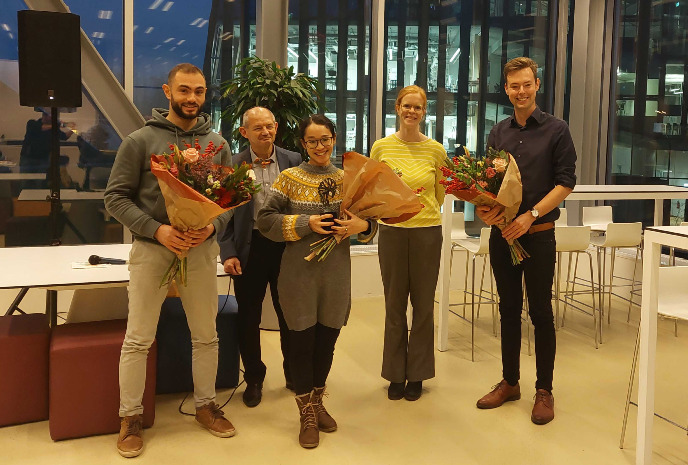
The fifth FSE Postdoc Prize ceremony took place on December 8th, 2023. This prize is organized by the FSE Postdoc Council and is a recognition to an outstanding postdoctoral researcher of the Faculty of Science and Engineering. The FSE Postdoc Prize 2023 was awarded to Dr. Kelley Leung from GELIFES. Congratulations Kelley!
FSE Postdoc Holiday party - 7 December 2023
With the holidays coming up, the postdocs of the Faculty of Science and Engineering got together at Brouwerij Martinus in December 7th, 2023. At this party postdocs had the opportunity to hangout, meet new people, and get into the holiday spirit. We had a lot of fun with drinks and snacks, some dancing and culture exchange! There was even room for some grinches with our White Elephant Gift Exchange! We look forward to keep doing these events and make our short time at the University of Groningen as pleasent and fruitful as possible!
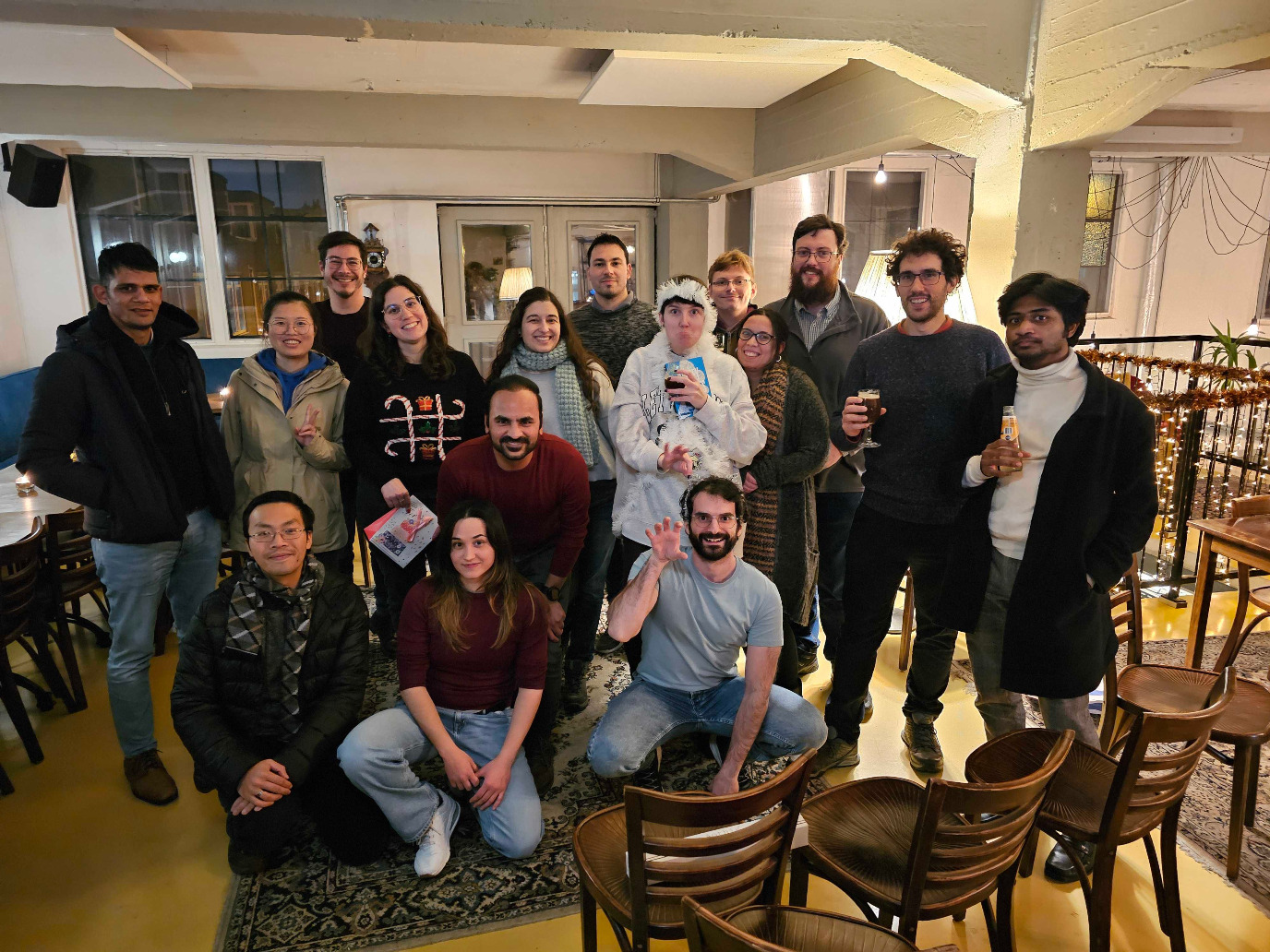
Spring PostDoc BBQ - 8 June 2023
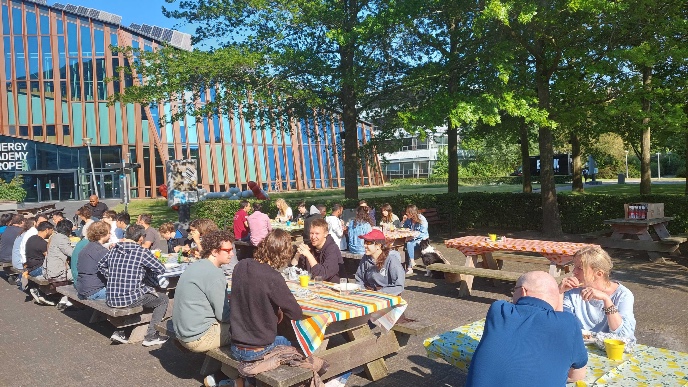
On june 8th, 2023 we had our Spring FSE PostDoc BBQ. Looking back, we can reflect on a delightful gathering filled with wonderful company, delicious food, and favorable weather. The event served as an opportunity to reinforce existing connections and establish new ones in a relaxed and informal environment. By uniting in this manner, we fostered a stronger network and a shared sense of belonging within the PostDoc community.
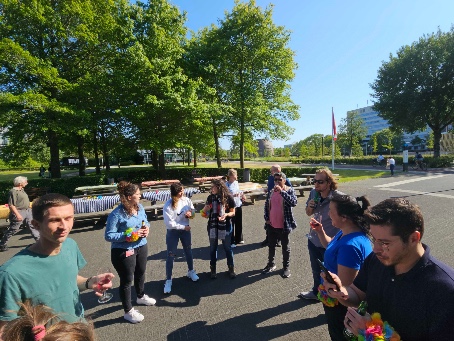
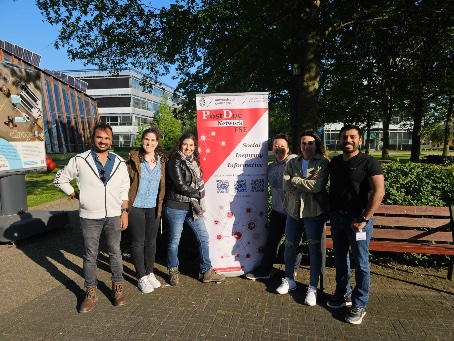
Thank you for joining the event!
FSE Postdoc Holiday party - 1 December 2022
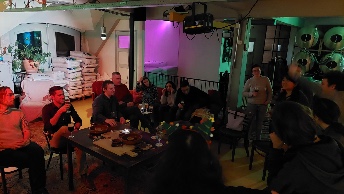
Before everyone went on holiday we got together at Brouwerij Martinus to hangout and get into the holiday spirit. We had a fun evening with drinks, snacks, and a really fun White Elephant Gift Exchange! In the following some pictures from the event!
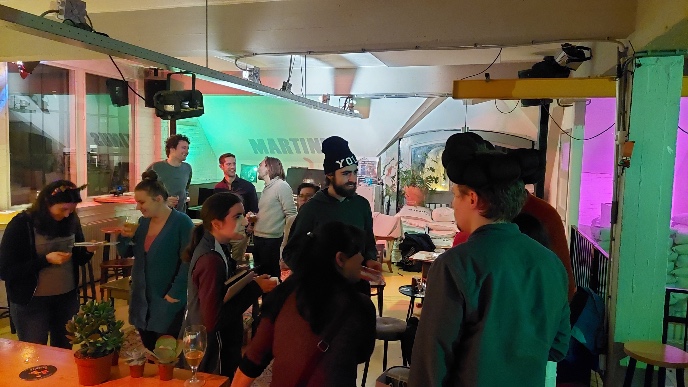
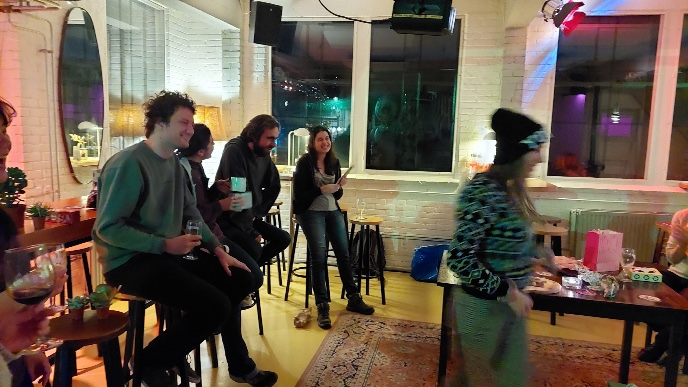
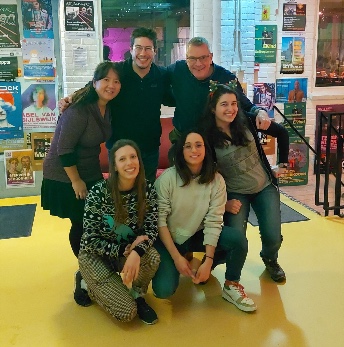
FSE Postdoc Prize 2022 - 24 November 2022
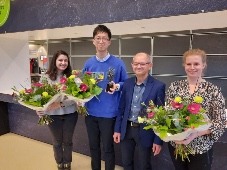
The fourth FSE Postdoc Prize was awarded to Dr. Qi Zhang of the Stratingh Institute for Chemistry. Qi received the prize for his impressive work and its high impact. His research focuses on dynamic disulfide plastics and smart materials. Dean Joost Frenken handed over the Postdoc Prize statue to him. The prize also includes EUR 2,500 for an international scientific visit.
Annual PostDoc BBQ - 3 September 2019
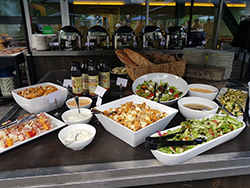
On 3rd of September 2019, we organized the Second Annual FSE PostDoc BBQ. Now we can look back on a nice event with great company, nice food, and the weather. Old contacts were strengthened and new contacts were made, in an informal setting. Coming together in this kind of way, enhances our network and the sense of being a PostDoc community.
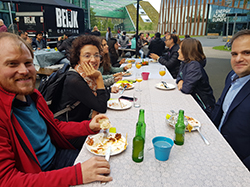
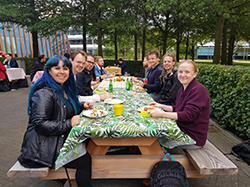
Thanks everybody
for joining!
Spring event "Life after a PostDoc" - 10 May 2019
On 10th of May 2019 we organized the FSE Postdoc Network Spring Event, with the title 'Life after a Postdoc'. About 60 people attended the event and saw the PostDoc council open the event with a short presentation explaining the council's work and the program for the day. 7 speakers were invited to talk about a wide range of career possibilities for postdocs. The first talk was given by drs. Liesbeth Volbeda, career counselor at RUG. She talked about how to take the best choices and what skills to improve in order to advance our careers and about the career development courses/trainings offered by the university.
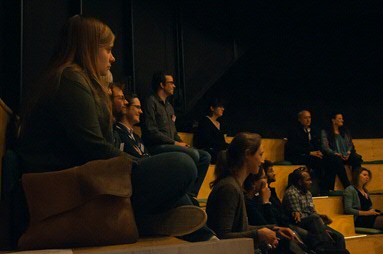
Next, drs Geert-Jan Arends, senior consultant at RUG’s strategy department for education and research, research policy and funding office, presented funding options for researchers, mainly the different grants offered by the European Union. Dr. Marnix Wieffer, senior marketing manager at Elsevier, told the audience about his career path, starting in academia and continuing in sales at Elsevier. He offered advices about a career in sales and encouraged us that as postdocs we have the necessary skills for this. The first part of the talks was followed by a coffee break, where the participants had the chance to talk with the invited speakers and to have their CVs checked by Human Resources.
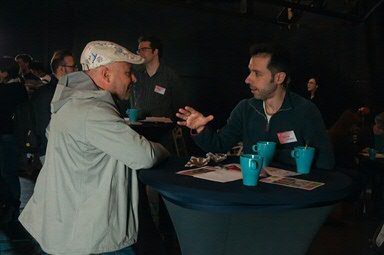
In the second part of the event, Prof. Aard Groen, Dean of Entrepreneurship in Groningen gave a talk about VentureLab North, a business accelerator for startups and existing companies in the Northern Netherlands, explained what to do to get support for a startup. Drs. Corina Prent, Director of RUG Holding B.V and Senior Development Manager talked about her career path from a degree in chemistry to industry and funding an own company. Next, Dr. Régis Gengler, Sr Product and Process development engineer at Johnson&Johnson Vision Care, Inc, talked about how he changed his career in academia to working in a company and offered some input on what opportunities are available for postdocs in industry. The final talk of the event was given by Dr. Luigi Debarberis, Senior Scientist at the Directorate of Energy, Transport and Climate at the Joint Research Center (JRC) in Petten, about what the JRC does in the EU and what positions are available for postdocs there. We closed the afternoon with a borrel where many handshakes and business cards were exchanged in a pleasant and open atmosphere. Thank you everybody!
The presentations of the speakers can be found below:
Liesbeth Volbeda - Careers of Postdocs
Geert Jan Arends - Have fun, get funded
Marnix Wieffer - Moving from academia into sales
Aard Groen - Entrepeneurship at RUG
Corina Prent - A career path leading to the RUG Houdstermaatschappij
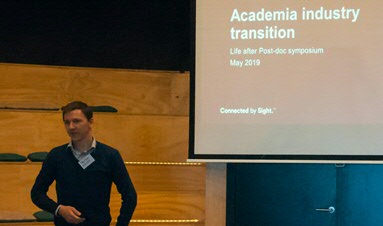
2nd Annual Postdoc event - 5 October 2018
After the official launch of the Postdoc network in 2017, the annual Postdoc event officially became recurring on Friday October 5, 2018. Approximately 50 postdocs joined this year, a great turnout, to learn about new career opportunities, to network and to have fun!
The event started off with tea and coffee with large numbers being drawn to the HR Talent development stand run by Liesbeth Volbeda where career counseling and courses to expand your skill set were advertised. Postdoc ambassador Diederik Roest welcomed everyone on behalf of the FSE board and proceeded to chair the event by announcing Aditya Iyer, who updated all participants about the progress and plans of the organisers, the Postdoc Council itself.
Two external speakers formed the main dish of the event: Dirk Kuijken informed us on the Energy Academy Europe, part of the New Energy Coalition aiming towards a transition away from natural gas and into sustainable energy sources. He explained the workings of the building we were sitting in, a zero-emission environment, which explained why we were sitting between cucumbers, strawberries and cucumbers while still being in the newest building on the Zernike campus. Second, Karin Bodewits, author of several novels on academic life and co-founder of NaturalScience.careers from spoke to us about both the funny and the dark side of the academic world, and helped us to prepare for our future careers.
We finished off the afternoon with a pub quiz, organised by the Postdoc council. Team Christeam scored an impressive 22 out of 30 points on topics like The Netherlands, general knowledge, music and sports, and took home the prizes. It was a good way to finish an afternoon with a great atmosphere and many new connections!
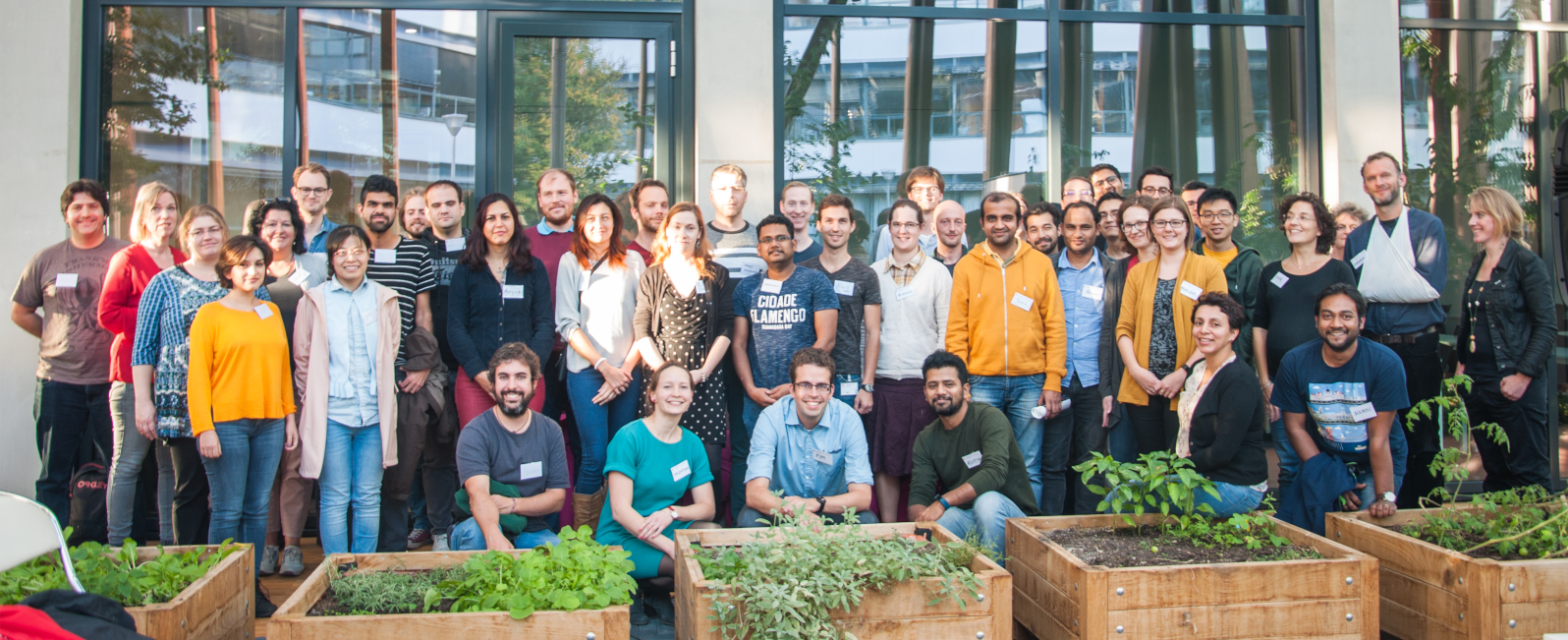
“Timeless” teaching credit
Teaching is an important part of academia, and teaching experience shows you have the communication and organisation skills important in any job. If you are a Postdoc involved in teaching, you should be able to get credit for this, even though the teaching responsibilities might officially lie at a PI. Since 2016, the university uses the Timeless application for this, found at https://timeless.service.rug.nl.
Every course coordinator can and should enter the people that were responsible for any teaching activities (including supervision of students) with the right amount of hours spent on teaching (under My Activities). Only the coordinator can enter this data and it is used to allocate teaching budgets, so it is important and official. If you are not the course coordinator, please check if they have correctly entered the hours you spent on teaching, because this record serves as evidence for your activities. If any coordinators haven't done this, please remind them to do so during the active academic year, as you can't go change previous years anymore, they are required to accurately enter these records by FSE rules. Supervision of BSc, MSc or PhD students should also be entered in the system, although this is somewhat more elaborate because of the lack of course codes and official allocated time.
As the FSE Postdoc council, we have made sure all Postdocs are automatically added to the Timeless system so they can get the credit they deserve for teaching. We recommend (PDF) printing your Timeless records from time to time for future reference or support of applications outside the University of Groningen. More information and a point of contact in the case of issues can be found at https://myuniversity.rug.nl/infonet/medewerkers/fse/onderwijs/timeless/
TT EVENT
The event on "How to become a Tenure Tracker" for PostDocs of the Faculty of Science and Engineering took place on Wednesday, May 30th 2018, at Van Swinderen Huys. The event was organized by the FSE PostDoc Council for postdocs that are considering TT as a future step in their careers. At the event, Henk Haagsma from the HR explained regulations of the tenure track system at FSE and Prof. Petra Rudolf (former head of the Graduate School of Science and Engineering) gave a fascinating talk about insightful tips on "how to become a successful TT". Dr Anna Salvati and Dr Jocelien Olivier (tenure track assistant professors at different stages of their career) shared their stories, daily activities and tips on how to manage the time as assistant professor, while Prof. Ming Cao shared his experience as successful tenured professor. Postdocs were able to interact with representatives of the Talent Development Office and receive information about grant applications, subscribe for personal meeting to discover how they can develop their career and prepare for tenure track.
| Last modified: | 11 December 2024 6.28 p.m. |
